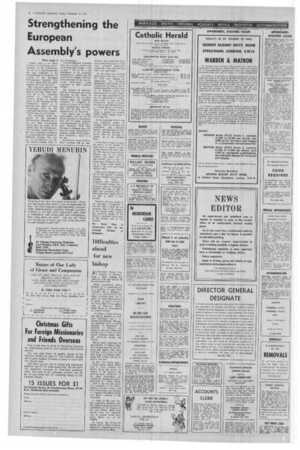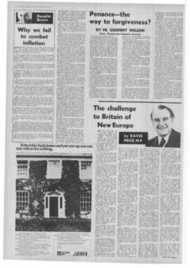Page 4, 10th November 1972
Page 4

Page 8

Report an error
Noticed an error on this page?If you've noticed an error in this article please click here to report it.
Tags
Share
Related articles
Plan To Unite Six Powers
Britain Has No Alternative To The Common Market
Market Decision 'will Mean More Ecumenical Contacts'
Gilt Wears Off Eec Gingerbread
Catholics And The Common Market
The challenge to Britain of New Europe
ON New Year's Day, the United Kingdom becomes a full member of the European Economic Community -the Common Market. This is an important and exciting moment in our history. Our entry offers us new opportunities and new challenges. But there is no guarantee that as a result of the single act of entry we shall benefit as a nation. It is entirely up to us.
I hope that the long argument as to whether we should or should not join is now behind us and that we shall as a nation seize our new opportunities and play a leading part as a senior partner in the New Europe.
Let us be clear about one thing. We are not suddenly abandoning our island status and becoming part of Europe. We have always been part of Europe. Indeed our island history has been inextricably interwoven with events on the mainland of Europe.
It is true that the most dramatic aspects of that continuing involvement have been wars. Many of us have experienced this at a personal level. I was fighting in Italy when I was 19. My father was one of the "First Hundred Thousand" who went to France in August 1914.
When I delve into my family history 1 find that in every generation some member of the family was 'involved in the various European wars which litter our history. We have never been able to disengage for any length of time from involvement in the affairs of Continental Europe.
If we are to be drawn into the affairs of Continental Europe when the going is rough, is it not better to be in from the beginning when we may be able to have a constructive influence upon European affairs? It is worth remembering what a bitter price we paid from 1914 to 1918 for the previous period of "glorious isolation."
In any case, in the power balance of the modern world these are rather anachronistic arguments. We have lost an Empire. The Commonwealth is not an adequate substitute. We need a new start and a new purpose which is bigger than ourselves, Our natural friends 'are our neighbours on the mainland of Europe, who have undergone similar transformations of their former positions in the world. The old Europe that dominated the world for so many centuries is now dead, but a new Europe has arisen Phoenix-like from the ashes of the old.
Therefore what we are doing in joining the European Cornmunity is to take our rightful
place at the centre of the New Europe, as an equal partner with France and Germany. We three — often enemies, often allies, throughout our histories — are the senior partners in the new Europe. And this is recognised in the Treaty of Rome.
Of course we should have been a founder member of the Community. For the first ten years after the Second World War we could have led Europe into any new "grand design" for Europe which we might have chosen to propose.
But we failed to seize that opportunity because our then leaders did not understand that post-war Europe wanted something more than the old alliances. It wanted to pioneer a new interdependence which transcended national boundaries — something more than a modern version of the Congress of Vienna.
And this is what the European Community is attempting to do. It is initially dedicated to economic co-operation leading to economic interdependence. But from the beginning the architects of the Treaty of Rome looked beyond the immediate commercial objectives of the new Community.
It is worth going back to the preamble to the Treaty of Rome. It affirmed as the "essential objective" of the Community "the constant improvement of the living and working conditions of their peoples." This included the reduction in "the differences existing between the various regions and the backwardness of the less forward regions" what we call regional development. It was therefore concerned about people, not just things.
The preamble drew particular attention to Europe's continuing commitment to the Third World in these words "intending to confirm the solidarity which binds Europe and overseas countries and desiring to ensure the development of their prosperity, in accordance with the principles of the Charter of the United Nations."
Finally, the preamble stated the Community's resolve to "strengthen the cause of peace and liberty by thus pooling their resources and calling upon the other peoples of Europe who share their ideal to join in their efforts."
Thus, from its inception the new Europe has had wider aims than the level of tariffs or the price of butter, although some of the debate in this country about British entry has hardly risen above that level.
It is no exaggeration to say that the New Europe really is about us, the ordinary people of Europe. It is about our collective future. It is about our social progress. It is about our genius and our weaknesses. Above all, it is about the promotion of civilised life, not only in Europe but, in so far as we Europeans have any influence, in the whole world.
When we look round the world today from South America through Africa to Asia. the advancement of civilisation is not an immodest or. irrelevant aim. Indeed it is highly ambitious. It is a great collective adventure — the like of which Europe has never seen before. I would reverse the famous saying of Canning and claim that it is necessary to call the Old World back into existence to restore the balance of the New.
The October "summit meeting" of the Heads of Government of the Nine laid down the strategic aims of the enlarged Community for the next ten years in considerable detail. In many ways that statement of aims is now just as important as the Treaty of Rome itself — if not more so.
Clearly the enlargement of the Community has given it a new impetus. The meeting of the Heads of Government clearly demonstrated the political will to succeed. It also confirmed the outward-looking nature of the New Europe. There were no overtones of a fortress Europe, unconcerned with the remainder of humanity.
The Heads of Government laid down a precise programme for the achievement of economic and monetary union. They went further and declared their intention to transform, before the end of the present decade, the whole complex of their relations into a European union.
Our Prime Minister has made it clear that the Cornmunity will be increasingly involved in regional, industrial, social and foreign policies, as well as in the monetary, com mercial and agricultural policies which so far have taken up most of the energies of the Commission and the Council of Ministers.
Particularly significant was this statement in the communique: "Economic expansion is not an end in itself. Its first aim should be to enable disparities in living conditions to be reduced. It must take place with the participation of all the social partners.
"It should result in an improvement in the quality of life as well as standards of living. As befits the genius of Europe, particular attention will be given to intangible values and to protecting the environment, so that progress may really be put at the service of mankind."
The Heads of Government attached as much importance to "vigorous action in the social field as to the achievement of the economic and monetary union." They said that it was essential to ensure the increasing involvement of labour and management in the economic and social decisions of the Community."
It is clear that the Community is now committed to a greater involvement in social policy than hitherto. The Heads of Government even talked of a new and cornprehensive social programme, including such aims as "co; ordinating measures of consumer protection" and "closely involving workers in the progress of firms."
The commitment to helping the Third World is complete. The Community "must respond even more than in the past to the expectations of all the developing countries." The communique spells out in some detail the various forms which this greater response should take.
The outward-looking nature of the Community is to be reinforced by quarterly meetings of the Foreign Ministers of the Nine. The aim of the new cooperation in external affairs is to "deal with problems of current interest and, where possible, to formulate common medium and long term positions . ."
This has never been attempted before. It includes the promotion of detente in Europe. In other words, the Community looks to the day when it will embrace the whole of historical Europe in one Community of free and democratic nations.
Finally. there is the whole question of reinforcing the institutions of the Community. To mc as a parliamentarian, the most important is the strengthening of the powers of control of the European Parliamentary Assembly. This is more urgent than the allied question of direct elections.
But I am most anxious that direct elections should not be delayed too long. Direct elections are a very important method of bringing the ordinary people of Europe closer to the workings of the Community, which as it develops will affect our lives increasingly. They are the traditional democratic method. A better has yet to be found.
The discussion about the powers of the European Parliamentary Assembly has in the past been concentrated mainly upon the extent of its control over the Commission. This has been useful, but it is far more important to discuss its control over the Council of Ministers, because they, and not the Commission, are the top decision making body in
the CommunIty. The Parliamentary Assembly must also develop control over the Community's budget. Until it does, it will not be a real Parliament. In the meantime parliamentary control over the Community's budget will have to be exercised by the nine na tional parliaments acting separately on their national budgets.
The Council of Ministers and the Commission have been instructed by the Heads of Government to "put into effect without delay the practical measures" to strengthen the powers of control of the European Parliamentary Assembly. This will be done in consultation with the Assembly.
This means that a great responsibility will fall on the British Members of Parliament who will be going regularly from Westminster to the European Assembly. With their F.uropean colleagues they will have the unique opportunity of creating a really effective European Parliament, which it is not yet.
As it becomes more effective direct elections will be vital. Without direct elections European parliamentarians will lack their essential democratic credentials. They will also lack their own grass-roots.
At the same time national parliaments will have to work out their own internal ar
rangements for involving themselves in the affairs of the Community. As long as the individual members of the Council of Ministers remain the representatives of their respective national governments and are not appointed on a European basis. so long will the Community remain a Europe des Fairies and will not become a "United States of Europe." Thus it will remain as far ahead as anyone can sensibly predict. What happens later is all to play for.
In 'the meantime there is the very important matter of loyalties. Most of us have well established and inherited loyalties. starting from the base of our families, through the parish onto our borough or county up to the national level.
If the New Europe is to grip the hearts of the people, we must learn to acquire a wider loyalty beyond our own country. This does not mean that we abandon any of our current loyalties. but rather that we add another level to our existing ones. Ultimately there is yet a further level, which is whole of the world, the United Nations ideal.
I have never thought it possible for the majority of people, who are brought up to national
loyalties, to make the enormous step forward to world loyalties without the intervening step of Continental loyalties. We may be able to make that enormous step intellectually, but I doubt that we are able to make it emotionally.
Therefore the new loyalty to the European Community is not only right in itself. but is a necessary step in the progress of the human tribes towards that universal loyalty to the whole of mankind which must be the ultimate aim of any Catholic.
Mr. David Price is
Conservative M.P. for the Easileigb Division of Hampshire.
blog comments powered by Disqus











